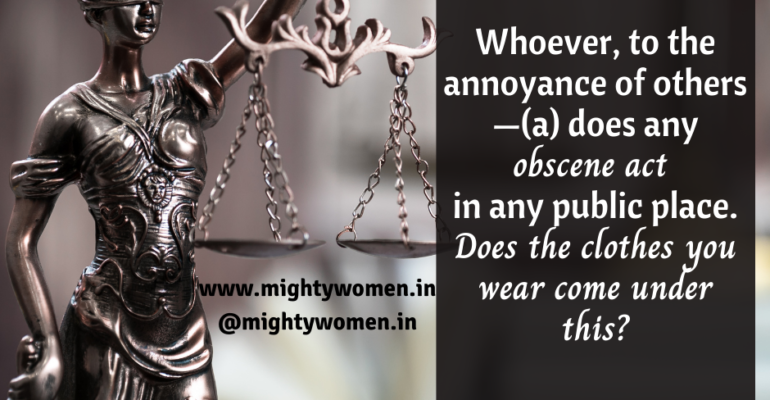Obscene Acts & Moral Policing Laws
September 8, 2020 2020-09-08 12:57Obscene Acts & Moral Policing Laws

In response to the messages I received,
I am clarifying whether the clothes worn by a woman can lead to problems as in the recent news, Congress leader Kavitha Reddy was accused of moral policing actor Samyuktha Hegde.
In regard to moral policing, though it differs from situation to situation, I would say taking the law into once’s hands is not legally right but certain cases like murder, a person can be arrested by any citizen.
Obscene acts and songs.—Whoever, to the annoyance of others—(a) does any obscene act in any public place, or
(b) sings, recites or utters any obscene song, ballad or words, in or near any public place, shall be punished with imprisonment of either description for a term which may extend to three months, or with fine, or with both
Section 294, Indian Penal code
The above act is mainly used to raging in colleges and public places. To understand the meaning of obscene under our laws and whether anyone can question you for wearing a particular dress, let’s look at this in detail.
The clothes a person wears cannot be defined as an obscene act.
Unless the act was to the annoyance to others and in a public place.
The framers of our Indian Penal Code did not define the term obscene, knowing that the mentality of the society changes as the years go by. The idea relating to immorality and indecency may change from time to time, and place to place with the generation gap.
So the task has been always on the supreme court to set the terms.
In Indian Hotel & Restaurants Association (AHAR) v State of Maharashtra (2019) the supreme court, admitting that society may perceive certain activities as immoral per se, but stressing that societal norms and standards of morality keep changing, urged that obscenity needs to be decided in the backdrop pf these changing social norms and values.
Another Supreme Court judgment dance bars do not come under the obscene act as the entry is restricted and people who pay and enter the place won’t be annoyed. So public places and people at large being annoyed are important aspects of this act.
The dance was a profession for those women and they have fundamental rights for that.
Supreme Court Of India
Still, to protect the dignity of women, the supreme court included that money cannot be thrown on women. Further to protect these women, the court said if any other obscene acts were found bar owners will be punishable for 3 years imprisonment.
Section 294 of the Penal Code, 1860 cannot be used as a tool for the invasion of civil liberties. Public disapproval of certain acts cannot lead to curtailment of fundamental rights.
Time and again it is well established that mere performance of an obscene or indecent act is not sufficient but there must be further proof to establish that it was to the annoyance to others. Annoyance to others is essential to constitute an offense under this section.
☺ Stay Strong & Mighty ☺
⋆ We are in this together, Just a message away for all your queries ⋆



